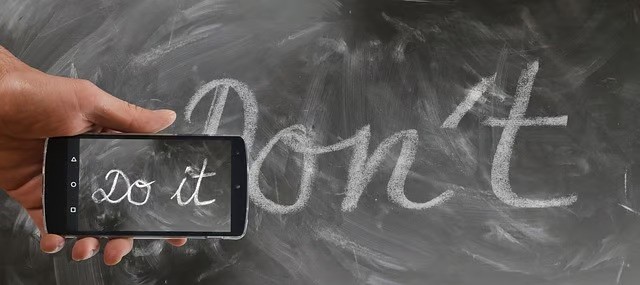Top 40 Unwritten Rules/Etiquettes in the US You Should Be Aware
In America, people always follow the law and the code.
But just like any other nation, America still has a lot of unspoken social norms, unwritten laws, and unwritten customs.
Respecting these unwritten laws and social norms is necessary for anyone who wishes to come to the United States for an extended period of time, whether for work, study, travel, or family visits. While ensuring you do not unintentionally hurt or offend the host, being aware of US customs and unwritten laws will make both your trip and life easier and friendlier.
The following list of 40 unwritten rules about American culture and daily life was compiled by KnowInsiders from a variety of sources. To help you stay away from doing things you shouldn't do while in America, carefully read the information below.
Learn more: Top 11 Taboos in the US You Should Avoid
1. Tip
 |
| Tipping isn't just a suggestion, it's a requirement. |
Because they don't always make minimum wage, service employees like wait staff, hotel room service, bartenders, and taxi drivers mainly depend on tips. A standard gratuity is added to the bill (before sales tax) in the amount of 20 to 25 percent; extra is given for exceptional service.
Usually, you leave a tip only when you eat at a restaurant. If you're at a fast-food restaurant chain, such as McDonald's or Subway, this does not apply.
The employee will assume you didn't like their service and might become irate if you don't tip them.
| Tipping customs can be intricate. especially in light of the rapid growth of tipping. According to WalletHub survey, 3 out of 4 Americans believe that tipping has gotten out of hand. According to 64% of Americans, tipping ought to be something you give freely rather than something that is required. |
2. Take off your shoes indoors
While some may find this odd, in America, leaving shoes inside the house is frowned upon. In order to avoid upsetting the homeowner and losing your invitation to return, don't forget to leave your filthy shoes outside the door.
In America, taking off your shoes in front of a home is seen as customary. This keeps filth and bacteria out of the house by keeping them from coming in from the street. In colder climates, your host might provide slippers or shoes for visitors; if not, you can wear bare feet or socks.
3. Never Cut in Line
 |
| Never cut in line |
Queuing is known as ‘waiting in line’ in the U.S., and it is expected in any situation that requires waiting your turn. On some forums, there have been many opinions about interrupting in some situations, but Americans in general do not accept this.
Shoving (jumping in line) is strongly frowned upon and may be met with verbal disapproval from others. Accept that your turn will come in time, and don't expect to jump into anything other than an emergency or genuine need.
| Americans value personal space, especially in public places and queues. It is customary to maintain a respectful distance from the person in front of you while waiting in a queue. If the person is using a cash machine, it is advised to stand approximately 2 meters away if you are next in line. When conversing with unfamiliar individuals, it is advisable to maintain a certain distance, roughly equivalent to the length of an arm. |
4. Setting Boundaries/Forget Personal Space
 |
| Americans prefer to have their personal space |
It seems that many Americans prefer to have their personal space respected and don't appreciate someone invading it by standing too close.
Proxemics refers to the distance individuals prefer to maintain between themselves while engaged in conversation. So, what's the ideal proxemics distance?
It's important to remember that most Americans value personal space, especially in large cities and northern states.
It's important to maintain a comfortable distance when conversing with someone and not assume that a new acquaintance would want to hug or kiss on the cheek when being introduced. Pay special attention in crowded places, such as on public transportation.
It is recommended to maintain a comfortable distance of at least eighteen inches when engaging in casual conversation with someone.
| It's generally best to avoid standing directly behind someone in line, and it's usually more comfortable to find a seat on a bus that isn't next to a stranger, unless it's necessary. |
5. Avoid discussing firearms
Despite the widespread legal use of guns in various parts of the US, the unfortunate reality is that mass shootings continue to happen.
Nevertheless, the constitutional right to bear arms is a highly contentious issue, resulting in enduring debates and repercussions across various societal groups. It is advisable to refrain from engaging in loud debates or openly expressing your views on gun ownership in public. It is important to be cautious and mindful of your surroundings, or perhaps it would be best to avoid the topic altogether if it could potentially lead to trouble.
Learn more: Top 15 Weirdest US Traditions That Confuse The World
6. Using Public Transportation: No Loud Conversations
 |
| No Loud Conversations |
It's important to consider the well-being of fellow passengers when utilizing planes, trains, buses, and subways. It is considered impolite in America to have loud conversations or phone calls in public, as well as playing music or videos without using headphones.
It is important to maintain a generous amount of space between yourself and other passengers. Additionally, it is worth considering the possibility of offering your seat to someone with reduced mobility.
7. Misunderstanding the concept of "small things"
According to Harvard Business Review, it is common for Americans to engage in open conversations with strangers and readily share personal information during initial encounters.
When an American strikes up a conversation with you on the bus or while waiting in line, it's not because they're being strange or nosy. They simply enjoy passing the time by engaging in friendly chats about enjoyable subjects such as the weather, sports, or current events.
8. Be Aware of Your Surroundings
Display proper etiquette when stopping to chat with acquaintances in public by not blocking entrances or entire sidewalks.
Similarly, pay attention to where you place your shopping cart, whether you're alone or having an impromptu family gathering in the aisle of a grocery store.
9. Be Publicly Affectionate
Public displays of affection (PDAs) are not as common in American culture, with couples generally being more reserved in public and rarely engaging in caressing or making out in public places.
When visiting, it is generally acceptable to greet with a quick hug, peck on the cheek, or holding hands. However, it is best to keep passionate displays of romance to private places. Otherwise, you could potentially make others feel uneasy.
10. Jaywalk
In almost every state in the union, it is unlawful to cross the street other than during designated crosswalks or in violation of traffic signals. You may even be fined for doing so.
Foreigners frequently find it difficult to recall this because most nations don't penalize such behavior. To ensure your safety and to steer clear of any confrontations with local law enforcement, always use crosswalks and heed pedestrian signals.
| It can be quite frustrating for someone in a rush when a group of people occupies the entire width of a sidewalk or walks on the wrong side. After all, this is the United States, not England. |
11. Walk on the sidewalk
It is important to consider social norms when deciding which side of the sidewalk to walk on. However, it is equally important to treat others with respect and not be impolite to those who may not be in as much of a rush as you are. Engaging in behaviors such as tailgating and other aggressive maneuvers is not only frowned upon in society, but it can also pose a significant risk to both yourself and others around you.
12. No Smoking
Smoking laws differ from state to state, but the majority of states have implemented strict bans on smoking indoors in public places. According to the CDC, as of 2023, a majority of Americans, particularly in the northern and western regions of the country, have been able to enjoy a completely smoke-free indoor environment.
It is important to consider the well-being of those around you and refrain from smoking near pregnant women, children, or individuals who are eating, even if it is allowed.
13. Throwing Trash
It is important to note that throwing trash on the ground, especially non-biodegradable items like food packets, is strictly prohibited by law in most states.
In addition to being against the law, engaging in such behavior is seen as impolite, immature, and lacking in respect for the local community and surroundings. Make sure to always dispose of trash in the appropriate bins, even for small items such as cigarette butts and chewing gum.
14. Neglect Gift Giving
Rest assured, gift-giving is not typically anticipated in most casual interactions in the United States.
When attending someone's home for dinner or a special occasion, it is considered thoughtful to bring a small gift. This gesture is sure to be appreciated by the host.
Consider selecting a universally beloved item such as flowers, wine, or chocolates, or a suitable gift for the person being celebrated.
15. Check Your Bags
Remember to maintain proper etiquette upon disembarking the plane and reaching the baggage claim area. It's considered impolite to gather around the baggage carousel before your luggage has been delivered.
While it is generally advised to stand two feet away from a moving luggage belt for safety reasons, it is considered polite to stand further back and wait until you spot your luggage, assuming you have a clear view over the crowd in front of you.
16. Don't worry about table manners
In general, eating in America is faster and simpler than in other countries. Although formal table manners still exist in America, they are usually reserved for upscale restaurants and formal dinners.
You don't need to be too concerned about strict eating rules as long as you avoid eating with your fingers, chewing with your mouth open, or talking with your mouth full.
17. It's always a good idea to leave some space at the urinal
 |
| leave some space at the urinal |
Standing close together while urinating may occasionally result in unintentional contact with others nearby.
It's generally considered more polite to give others some space in an empty bathroom. If you see someone using a urinal, it's best to choose a different one that is not directly next to them. And under no circumstances should you make eye contact. This is also highly regarded in many advanced and cultured nations around the globe.
18. Utilize a more subtle form of communication
Having a deep understanding of American culture, it is evident that Americans have a tendency to be more straightforward in their communication style compared to many other cultures. Subtle body language and ambiguous euphemisms may be effective in other contexts, but not so much in American culture. While their directness may come across as blunt or even rude, it is important to note that this is not their intention.
When making a request or expressing a complaint, it's important to be direct and assertive while maintaining a respectful tone. This approach will help ensure that your message is understood and taken seriously.
19. Conversation 101
It is crucial to demonstrate interest in the person you are conversing with by allowing them to speak. Instead of delivering a lengthy Shakespearean soliloquy, try engaging the person you're conversing with by asking them questions.
Based on a study conducted by Harvard, engaging in conversation by asking questions can enhance your likability. It's undeniable that a significant motivation for Americans to adhere to unspoken social norms is the desire to be well-liked and accepted by those in their social circles.
20. Stick Together
When attending a party with a friend, it is important to ensure they feel included and comfortable throughout the event, rather than leaving them to fend for themselves if they are unfamiliar with the other guests.
It's important to consider the potential consequences before engaging in a lengthy conversation with someone who is flirting with you. Jeopardizing the trust and respect of your friends is not a risk worth taking.
21. Closing Time
Any current or former employee working at a store where customers enter can confirm this: It's generally expected that customers should leave the store before it closes, rather than waiting until the exact closing time.
Although you may be feeling energized and eager to shop, it's important to consider that many of the employees have just completed a long shift and are exhausted, eagerly awaiting the end of their workday.
22. Flushed Away
Alright, I'm sure many of us are familiar with this common expectation: to flush the toilet after using it.
According to Dr. Engel, an epidemiologist, there is no health risk associated with the practice of conserving water by following the philosophy of "If it's yellow, let it mellow; if it's brown, flush it down." Flushing is an absolute necessity in public spaces due to the prevailing social norms in the US.
23. Avoid summoning the waiter to the table
Calling a waiter to your table is a common practice in restaurants worldwide, as discussed on various experience sharing forums.
Contrary to cultural norms in the US, it is generally frowned upon and may lead to subpar service if you request the waiter's presence at your table.
24. Avoid Snapping your fingers at a waiter
It is considered impolite to snap your fingers to get a bill from a server at a restaurant. Forever. It is generally considered impolite in the United States.
To request the bill, make eye contact with your server and discreetly indicate that you require assistance or the bill at your table.
They will promptly bring your order to your table, and when you are ready, you can kindly request the bill in person.
Show kindness and respect towards individuals experiencing homelessnessFrom my extensive knowledge of American culture, it is important to remember not to ignore the homeless. Instead, it is recommended to politely decline and wish them a nice day. Life in America can be challenging, as financial struggles and unemployment can lead to the risk of homelessness. When encountering homeless individuals, it's always a kind gesture to simply greet them and wish them well, even if you don't have anything to give. When engaging in a lengthy conversation with them, it's not necessary to convey excessive disappointment or sympathy. |
25. Keep It Clean
Embrace your individuality and feel free to be yourself in the comfort of your own home. However, it is important to clean up after yourself when you are in a shared space such as an office. This could potentially be one of those uncommon social norms that unexpectedly becomes explicitly stated in a sarcastic mass email sent by a coworker who is feeling frustrated.
Based on a survey, nearly half of Americans confess to disregarding messes in the hopes that someone else will take care of them.
27. No Haggle
 |
| Most of the time, you can't haggle for prices, and you can't ask the cashier to take off tax |
In America, even small, privately run stores and casual food stalls have fixed prices, and it is not customary to negotiate over them.
It is generally considered impolite and inappropriate to haggle, so it's best to avoid doing so unless you are in a setting where negotiation is expected, like at flea markets or used car dealerships.
Typically, it is not customary to negotiate prices or request tax exemptions from cashiers. It's important to keep in mind that tax is not included in the price on the shelf, so it's best not to dispute this with the cashier.
| There is a noticeable difference in the cost of various items in America compared to when you resided in Europe. In the United States, prices listed do not include taxes, unlike in Europe where taxes are already included. |
28. Be Unappreciative
Showing appreciation is a crucial aspect of American culture, and failing to express gratitude when appropriate is seen as impolite. Remember to express gratitude to servers, cashiers, bartenders, and anyone who assists you during your stay.
Expressing gratitude is deeply rooted in American social norms to the extent that some Americans may not forgive a failure to show appreciation, even if it comes from someone who is not from the United States.
29. Show consideration for local customs and beliefs
It's important to be aware of the religious diversity in the United States and respect the local beliefs, without assuming that your own religious views or atheism will be given priority.
It is important to be mindful of religious sensitivities and to show respect for local beliefs and customs, particularly in regions with a significant Catholic population, such as the Southern states.
Additionally, it's important to dress modestly when visiting religious sites or buildings.
30. Take extra caution when interacting with pregnant women
There are appropriate and inappropriate ways to offer support and encouragement to a pregnant individual.
It is important to always respect personal boundaries, especially when it comes to pregnant women. It is best to avoid touching a pregnant woman's belly unless you have a close relationship with her.
When interacting with someone you know, it is customary to politely inquire if the woman is comfortable with having her belly touched before proceeding. It is important to remember that these places are not petting zoos, and assisting without proper permission can lead to significant consequences.
Learn more: Top 12 Popular American Foods That Are Banned In Other Countries
31. Fishy Situation
Allow me to share another unspoken office guideline with you: Warming up a pungent dish in the microwave.
It's not pleasant for others to endure the lingering smell of your lunch throughout the day, and especially not for an entire week in the worst-case scenarios.
Based on KitchenerClean's findings, certain foods should be avoided when microwaving due to their strong odors. These include fish, curry, popcorn, vegetables, and hard-boiled eggs.
32. Hygiene Habits Abroad Viewed as Unhygienic by Americans
It's interesting to note that what is considered hygienic in the United States may not necessarily be the case in other parts of the world. It's interesting to observe the different hygiene practices around the world. For example, some cultures use unconventional methods like using twigs as toothbrushes or washing hands with ash.
33. Always remember to obtain the person's consent before calling for an ambulance.
It is important to assess the situation and inquire if someone requires an ambulance before making the call, unless it is an urgent and critical emergency.
It can be quite a costly ride that can have long-lasting financial consequences for many individuals.
34. Do not say "How are you?"
Is there ever really an expectation for a genuine response when someone asks, "How are you?" It seems to be more of a social convention than a genuine inquiry into one's well-being.
"When someone asks you how you are, the appropriate response is typically a positive one, such as 'good' or 'great'."
Regardless of the challenges you may be facing, it seems that people are not genuinely interested in knowing how you are doing.
It's common courtesy to not expect a genuine answer or an in-depth explanation of how someone truly feels. If you attempt to provide a genuine response, individuals may struggle to respond appropriately.
35. Don't call football "American Football"
Baseball may be America's national sport, at least on paper, but real ones understand that football is more than a sport — it's a religion. Also, on this side of the pond, we call "European Football" soccer.
36. There's an etiquette to riding in an elevator
When riding in an elevator with others, it is customary for everyone to face the door and refrain from engaging in conversation. It can be uncomfortable when there's a silence, especially for someone who is larger in size compared to the women around them. Avoid engaging in small talk with your elevator companions, as it is generally considered inappropriate.
37. Politics is a more taboo topic
It's important to be mindful of what is not being said, and it's also wise to avoid discussing religion. Given the current state of politics in American culture, it's advisable to avoid getting involved.
Political topics in the US are highly contentious. When it comes to politics, Americans generally prefer not to engage in casual conversations, as it may be perceived as an intrusion into their personal space.
38. No comment on somebody's weight
 |
| No comment on somebody's weight |
Avoid making remarks about individuals' weight or size. In certain cultures, 'gordito' or similar terms may be seen as endearing nicknames. It's highly unlikely to be perceived as anything other than rudeness in this context. It's advisable to refrain from speaking, even if you believe your words are meant as a compliment.
We understand that many individuals from other countries may perceive us as having a larger body size. We are aware that many of us have a higher body weight. It's best to remain silent. Also, it's best to avoid commenting on someone's weight, regardless of their size.
39. Is It Rude To Ask Someone How Much They Paid for Their House?
Most people know someone who has purchased a new home, but the question of how much they paid could seem a bit invasive. sSuch a question might have been considered gauche, just as much in poor taste as inquiring about someone’s salary or the amount in their bank account.
Although the majority of people won’t mind if you ask how much they paid for a home, if you want to play it safe, you’ll want to couch your question carefully.
If you’re having a conversation about the home, you can ask less-pointed questions such as, “we’re just starting the process of looking for a house; do you know the range of houses in your neighborhood?” That leaves homeowners room to talk in broad terms about the neighborhood or get specific if they’re comfortable going there.
40. Social Invitation
In American culture, it is generally expected that you do not show up somewhere unexpectedly, even if you have been invited.
Americans often use the phrase, 'You should come over sometime!' in a casual manner. Why don't you come over? However, the intended meaning is not "Feel free to drop by my house unannounced and come in for a cup of coffee or tea." It is generally expected that you should arrange a specific date and time in advance, rather than simply showing up unannounced, if you would like to have coffee or a meal.
In Conclusion
There are numerous things that should be avoided and topics that should be approached with caution in daily life in America, which cannot all be listed here. On certain forums, individuals from both American and foreign backgrounds frequently discuss instances where they may not adhere to unspoken rules and customs.
Do you agree with these if you're in the United States? If you happen to be outside of the United States, I'm curious to know about the implicit social norms in your country.
Can you contribute anything to this list? If you have any insights, feel free to share them with me in the comments section!
 Top 13 Craziest and Dumberest Laws in the U.S. Top 13 Craziest and Dumberest Laws in the U.S. The United States, a vast, dynamic, and heterogeneous nation, even permits municipalities and states to enact their own legislation. |
 The Top 20 Most Absurd Laws in the US That Remain in Effect Today The Top 20 Most Absurd Laws in the US That Remain in Effect Today Which US laws are the strangest? the If you live in the United States, have you ever broken the law because you didn't know it ... |
 Top 10 Most Ridiculous and Crazy Laws in History Top 10 Most Ridiculous and Crazy Laws in History No matter where you live, you're going to run into some laws that defy common sense, even if they're so bizarre that it surprises you. ... |
 Top 10 Weirdest National Holidays In The U.S Top 10 Weirdest National Holidays In The U.S There are plenty of peculiar national holidays in America. It's unfortunate that not more people are aware of them. |

























